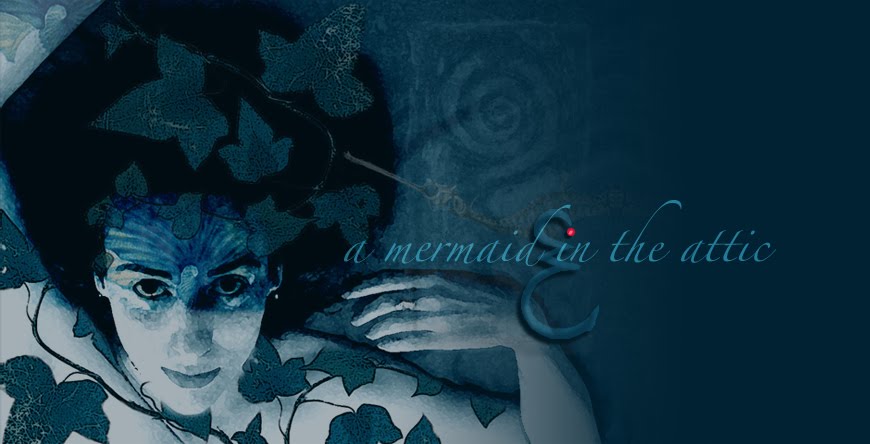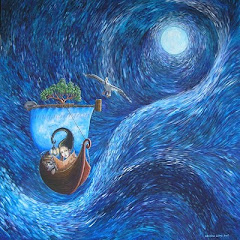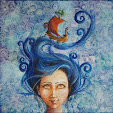Although many of us realise we're not very good at dealing with it, it seems to me that artists and musicians, writers and pretty much anyone who lives a creative life, at least has some understanding of this cycle. Many of us know deep down that sometimes we need to stop and refill the well of inspiration, go off by ourselves perhaps, and give ourselves time. Not always easy of course, in a world dedicated to deadlines and 24/7 and better, bigger, faster, NOW. And we may fight it, ignore it, deny it, try and push it aside, but most of us know that sooner or later, we'll have to give in and let it run its course. And we also know (though it's often hard to remember) that quite often, we will discover something new, a new direction, a different way of seeing, a solution to a problem, in that very darkness we've been trying to avoid. That usually, if we don't dig our heels in and refuse to go, kicking and screaming all the way, then the journey, though painful, might actually be worth it.
But I don't believe this cycle is peculiar to artists. I think it is a HUMAN cycle. And I think it is a human cycle that for too long the modern world has been trying to pretend doesn't exist, and that it does so at great risk. Because I suspect it may be one of the reasons that, despite living in absolute luxury and abundance compared with so many in the world, we seem to be in the middle of an epidemic of depression.
Now perhaps I should say right now, that I am not a psychologist or a doctor. And I don't for a moment believe that every case of clinical depression can be cured by someone patting your hand and saying "it's OK, you'll be fine, there's nothing to be afraid of, it's just going to get dark for a while". That would be ludicrous. So what you have here is simply the musings of someone who has suffered from grief, depression (PND to be specific), and also has spent a fair bit of time on the ups and downs of the creative ferris wheel.
In 2000, a week or two after I lost my little girl (story here for those who haven't stopped by before), I remember sitting in my doctor's surgery sobbing my heart out. As you might expect. And she offered me anti-depressants. She said it wouldn't take away the pain, but it would take the edge off my grief. I was floored by this. Why on earth did I need to 'take the edge off my grief'? Why would I want to take away the pain? I believed I was feeling exactly what I SHOULD be feeling given the circumstances. And more important, exactly what I NEEDED to feel in order to mourn properly, to walk the journey that can not, must not, be avoided, to heal and to come out the other side stronger, with peace and acceptance in my heart. But it seems there was something unacceptable about my grief, about a woman sitting sobbing her eyes out. Visible grief is just not acceptable in polite society.
A few months after the birth of my last little one in 2004, I could feel something was not quite right, but it took the visiting health sister to pinpoint it. She very gently suggested to me that I might be suffering something more than just 'baby blues'. And I'm very grateful that she pointed me in the direction of a women's health clinic with a counselling and group therapy service. With all due respect to overworked GPs, I think it's pretty likely if I'd visited my local medical service, I would have been given a prescription for anti-depressants after a short consultation. I know people who have.
Clearly, I did not have as bad a case of PND as some women suffer from. I managed to function OK (mostly, though there were times when I just curled up on the kitchen floor and sobbed), I looked after my girls and I did not actually have a problem bonding with my littlest. I just felt as if I was disappearing, fading away into nothing, that everything I'd ever been, everything I'd ever done or created, everything I'd imagined or built, was gone and would never be back. I loved my girls so fiercely it hurt, and yet there was resentment too, a truly horrible twin-sided coin. And yet, meeting with other mums (who also looked normal on the outside) going through it too, talking and having a good cry in the one on one sessions with the counsellor, got me through. As well as, it MUST be said, with huge support from my family, who understand the need for a good cry and a good talk, and my poor Beloved, who had been through so much with me, and somehow trusted that I'd get through this too if I was allowed to find my own way.
But I also know mums who were given anti-depressants and years later were still on them, afraid that if they give them up, those feelings might come back. I've met people who mentioned to their GP that they've been feeling down lately, and were given prescriptions. It seems that we are afraid of being sad, or melancholy, or down. Even that society demands that we must not be. And yet, aren't these emotions all perfectly normal?
On the Beyond Blue website, there is THIS checklist. If you have more than 3 of the symptoms for more than two weeks, you probably have a depressive illness. I just tried it, ticking all the boxes that equate to how I feel when I'm in a creative funk and can't muster the energy or the motivation to even pick up a pencil. I scored 11. Most of the time, I don't go for a whole two weeks feeling like that, but there have been times when I have. Or I've had some of the symptoms for that long (or longer) but not all. I've had ups and downs most of my life, and even as a kid I had my 'melancholy' times. The PND WAS scary, it lasted a long time, but generally, I don't panic when I'm feeling down because I KNOW this feeling. I know it will be a pain, and I hate being there, but I know it will go, and it might even leave behind something useful. It's kind of normal.
But what if I didn't know? What if I hadn't really felt this before? What if no-one around me could tell me about it, what if I'd never seen anyone else deal with it? It would scare the hell out of me I think. And I wonder, I really wonder, whether we set ourselves up for a bad dose of it by allowing ourselves to run to the point of empty, because we don't know we shouldn't? We don't allow ourselves 'downtime' until it becomes 'DOWN time'. We are part of the natural world, and without any exceptions I can think of off the top of my head, it works in cycles: action/inaction, growth/rest, flow/ebb. In order to flower in spring, the almond must sleep through winter. This is what I said in comment to Terri's 2nd post:
The need for fallow time. Everything else in the natural world works in cycles of activity and inactivity, fallow and productive. Why should we humans think we are any different? And yet we push ourselves, or allow others (clients, deadlines, family and so on) to push us to keep going, not stop (or feel guilty if we dare to), and keep producing. No wonder the well gets empty, the creative flowering grows weaker and less beautiful. But it's not just in the arts, it's everywhere. I just noticed a headline yesterday, that Australian workers are working longer than ever hours, and yet are more inefficient than ever before...hmmmm, I wonder why?!
A few years ago, I attended a workshop led by Wendy Rule, an amazing singer/songwriter. As a pagan/wiccan, she's interested in myths and archetypes, and is endlessly inspired by the myth of Persephone and her underworld journey, the cycle of descent and ascent. And she said something that stuck in my mind. That this descent into the underworld is a necessary journey, it's a chance to 'cleanse', to slough off the unneeded bits of our psyche that have outlived their use, to 'lose the baggage' we've been carrying around. And without this voluntary going down, going within, this withdrawing and retreat time, we end up carrying around all these dead bits of ourselves, parts that rot like bits of old meat, more than likely making us sick in the process. That might sound a bit 'out there' but if you think of people who have worked so hard for so long that they burn-out or suffer from a break-down, then that's pretty much the same thing, just in less colourful language.
So I wonder...if there were elders (who had journeyed there before) to tell us 'it is not an abyss, it is a tunnel with a light at the end of it', would we be less scared? If we regularly allowed ourselves time to be truly 'fallow' would the journey be shorter and easier than if we fight it all the way? I wonder too, if we medicate at the first sign of the downward journey (instead of waiting to be sure it's something more than that and needs more than just time and retreat), are we in danger of precariously balancing ourselves forever on the edge of what looks like a terrifying bottomless black pit? When if we allowed ourselves to step down gently into the dark, we might find a well trodden path that is not so dark or terrible, and we might find we have things to leave there, and new things to bring back into the light.
Because it's in the dark that old things compost down into rich new soil. And it's in the dark that the seeds that become the trees that provide the oxygen we breathe, germinate.








